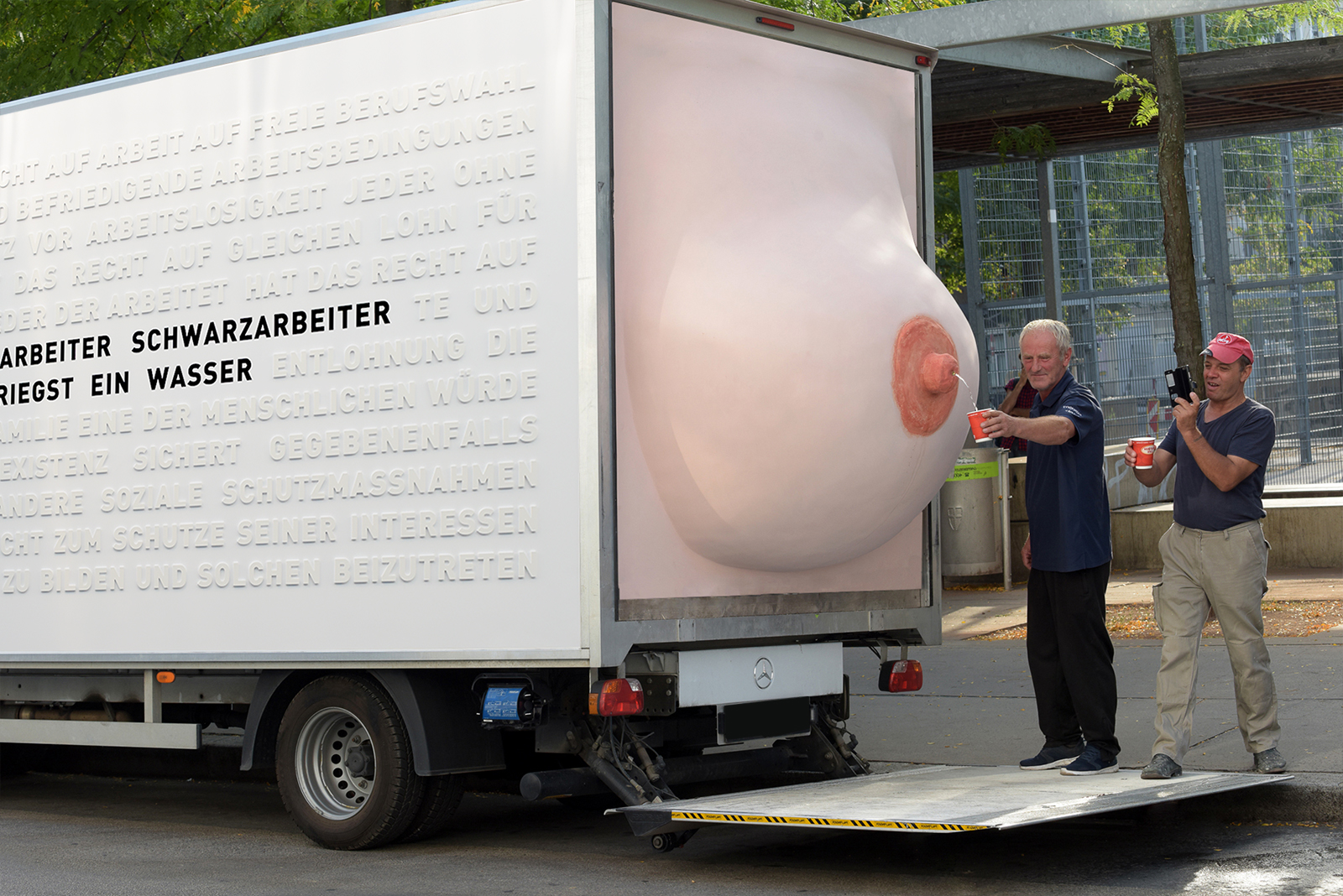Die Wiener Maria
Trading for basic needs

From 23rd to 30th of August, architect and artist Milan Mjialkovic will be presenting a driving fountain of cold water in the shape of a breast, driving along Viennese so called „workers’ strip“ in Triester Straße, Herbststraße and Brünner Straße.
„Kann alles Arbeit“ (Can do all work) is a typical statement, often heard in the illegal
subculture of Vienna’s construction branch. It usually opens the negotiations, while depicting a dilemma at
the same time. A person who does not want to be restricted from work and wage, has to sell himself - even
below value. Eight Euros is the typical salary per hour for men from Bulgaria, Romania, Poland, Hungary,
Ukraine and Kosovo, many of them being professionally trained in their work field. They hope to get work at
places like Vienna’s Triester Straße by the dozens, hoping to be taken to one of the numerous construction
sights near the city. They have no law behind them to insist on being paid, no social security, no healthcare,
no accident insurance. Far from negotiations about non-wage labour costs, collective contracts or a twelvehour-day,
the nation’s social system at Matzleinsdorfer Platz, day by day, works on its own eroding in stoic
calm. By doing so, it approves of a growing, huge black labour market used by parts of the society and
ignored by the others.
This is an issue which has been bothering Milan Mijalkovic, born in 1982 in Skopje, Macedonia, for a ling
time. Since 2001, he lives in Vienna, where he studied architecture and worked in such jobs by himself to
finance his education. Jobs that put him to hard physical challenge. In 2016, the so called „Arbeiterstrich Collection“ was established as a collection of photographs taken clandestinely by
illicit workers at their working sights.
In the same year, Mijalkovic participated in a group exhibition in frei_raum Q21 within the 50th anniversary of
the guests worker agreement between Austria and the Republic of Yugoslavia. On top of six-foot high stands,
two illicit workers were positioned in front of the entrance, awaiting the appearing of the then Foreign and
Integration Minister Sebastian Kurz, one of whom shaking Kurz’s hand later.




The basic thought to this performance: „Die Wiener Maria“ is, by the words of Milan Mijalkovic, questioning:
„What appreciative gesture does every one of us offer to welcome those working here?“ The glass of water
as existential minimum consensus hereby turns into a mobile fountain. Funded by the Bundeskanzleramt,
Mijalkovic, in preparation for this event, ordered a breast with porcelain surface to be created in two
meter dimension. The breast is mounted at a small truck and is supposed to drive along the Triester Straße
daily within the week of Aug. 23rd to 30th, passing Herbststraße and Brünner Straße, while releasing cold
water via the nipple.
„Schwarzarbeiter, Schwarzarbeiter, kriegst ein Wasser“ („Illicit worker, illicic worker, come, have some water“)
is the writing on side of the truck, printed in single letters by Milan Mijalkovic. The promise is framed by
passages from the Universal Declaration of Human Rights from 1948. „Everyone has the right to work, to
free choice of employment, to just and favorable conditions of work“, reads the first sentence. As the places
passed by the truck are often used to offer and demand more than just „all work“, an overly dimensioned
breast becomes even more striking.
supported by:
![]()

2018
Idea and concept: Milan Mijalkovic
Sculpture (breast): Johannes Falkeis
Media & Press: Christina Werner
Text: Mareike Boysen
English translation: Carsten Schmidt
Photo: Joanna Pianka
Organisation: Patrick Juttel
Idea and concept: Milan Mijalkovic
Sculpture (breast): Johannes Falkeis
Media & Press: Christina Werner
Text: Mareike Boysen
English translation: Carsten Schmidt
Photo: Joanna Pianka
Organisation: Patrick Juttel
© 2025 Milan Mijalkovic. All rights reserved.